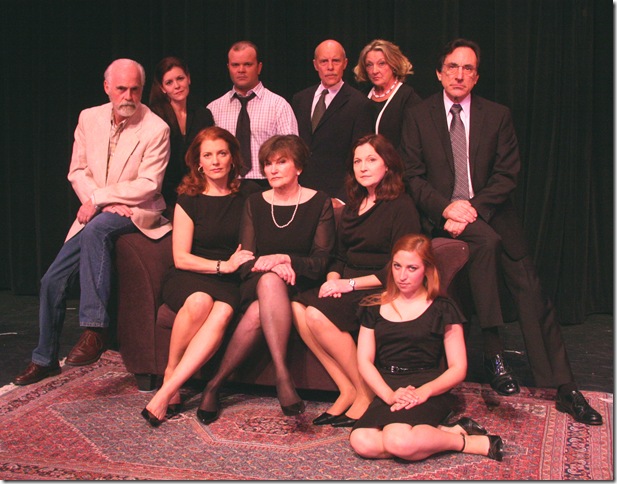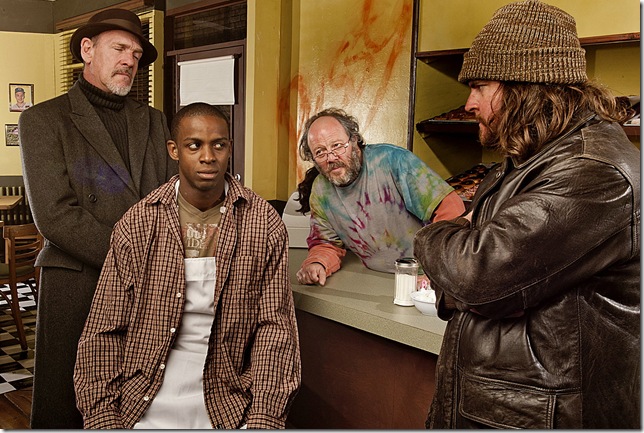In order to maximize the chances of being produced in these precarious economic times, most writers now limit themselves in their plays’ cast size and physical requirements.
But every now and again comes an Angels in America or a Coast of Utopia, from playwrights who dare to think on a grand scale, resulting in works resulting in peak experiences for their audiences.
Just such a play is Tracy Letts’ August: Osage County, a three-and-a-half hour epic whirlwind, requiring a cast of 13, a major theatrical meal amid a theatrical landscape of so much snack food. In it, Letts mines the familiar territory of the dysfunctional family, but he does so with such fury and force that he wipes away our memories of other dramatic sagas on the subject.
Still, a script of this magnitude is not an easy matter to produce, let alone for a company like Actors’ Playhouse of Coral Gables, whose strength is musical theater. Yet Letts’ play has obviously gotten the creative juices of director David Arisco flowing and the material has attracted some of the region’s finest acting talent. The result is a production that is likely to be a landmark of South Florida theater for years to come.
You could call August: Osage County a tragedy, except it is happening to a family other than your own and watching the verbally abusive meltdown is so much fun.
It all takes place in the sprawling three-story home of the Weston clan (artfully designed by Sean McClelland), located in a small Oklahoma town near Tulsa. The family is headed, at least briefly, by Beverly Weston, an alcohol-fueled professor and poet, who we hear describing his marital woes to a prospective housekeeper. He hires her and walks away, never to be seen alive again, but was Beverly’s death a drunken accident, foul play or suicide?
The answer is of little concern to his coarse, pill-popping wife Violet who convenes the family — three grown daughters and their somewhat significant others — to wait for word of Beverly’s situation and then to attend his funeral.
At they wait, the impromptu family reunion becomes a clawing match, with secrets exposed at regular intervals and the weak pounded into submission by the stronger.
Annette Miller, last seen at Actors Playhouse as the wily, outspoken title character in Martha Mitchell Calling, dominates the evening as sharp-tongued Violet, staggering through life in a drug-induced fog, just sober enough to lash out at whoever is in her path. That is usually her three daughters, the eldest of whom, Barbara (a steely Laura Turnbull), pulls an Alexander Haig and declares herself in charge of the calamitous situation.
The middle daughter, Ivy (Kathryn Lee Johnson), has been her parents’ caregiver, but wildly underappreciated, and destined to be pushed aside. Youngest daughter Karen (Amy McKenna) has unwisely gotten engaged to a shady Miami businessman (Stephen G. Anthony), whose roving eye locks onto Barbara’s teenage daughter Jean (a crafty Jackie Rivera).
They are at the core of August: Osage County, but even the secondary characters, like Violet’s abrasive sister (Barbara Bradshaw), her meek husband (Peter Haig) and their embarrassment of a son (Erik Fabregat) have their stinging moments.
The centerpiece of the play is a family dinner that begins civilly, but soon escalates into general combat. One would think there was nothing left to reveal by the third act, but Letts saves his most devastating revelations for the evening’s final third.
Arisco lets the play breathe a bit, but knows how to turn on the theatrics for maximum effect. Only the most honest of theatergoers will see themselves among these irredeemable souls, but they will probably recognize some of their family members.
AUGUST: OSAGE COUNTY, Actors’ Playhouse, 280 Miracle Mile, Coral Gables. Through Sunday, April 3. Tickets: $42-$50. Call: (305) 444-9293.
* * *
By a quirk of scheduling, across town in Coral Gables, Letts’ follow-up to August: Osage County, the more benign, but worthy Superior Donuts is playing at GableStage. It is a consciously conventional play, even without comparing it to Letts’ Pulitzer Prize winner, and surprisingly upbeat when judged against Killer Joe or Bug, two other scripts by Letts that GableStage has produced.
Not that Superior Donuts is without conflict or violence, but unlike his other works, you can sense the playwright letting the audience off the hook with a concluding suggestion of hope that his other three plays certainly do not have.
The action all takes place inside a North Side Chicago donut shop, a rundown neighborhood coffee-and-cruller joint that 60-ish Arthur Przybyszewski — the “P” is silent — long ago inherited from his father. But even though the area has gone to seed, Starbucks has just opened across the street and it looks like Arthur’s shop is on its last legs.
Prior to the play’s start, someone has broken in and defaced the shop’s interior, but Arthur remains unfazed, or perhaps he gave up on any grand aspirations for the place long ago.
If so, he has his hollow complacency shaken by the arrival of Franco Wicks, a 21-year-old street-smart black dude, who talks his way into a job and into Arthur’s heart. Full of bravado and non-stop gab, he totes with him a messy manuscript of what he calls his “Great American Novel,” but he also carries the burden of $16,000 in gambling debts.
At its best, Superior Donuts draws the growth of the unlikely friendship of Arthur and Franco, as they trade wisecracks and world views. Franco is brought vividly to life by a very promising young African-American actor, Marckenson Charles, whose swagger and verbal confidence are both ingratiating and persuasive. He plays off of the naturally ebullient Avi Hoffman, here underplaying as a man whose life went on hold when he fled to Canada during the Vietnam War, evading the draft.
At its worst, Franco is confronted by his tough-talking bookie (Gordon McConnell), a guy of indeterminate nationality, who threatens him over his overdue loan. Unlike the rest of the play, which breathes with such authenticity, this subplot feels like a bad rewrite of I’m Not Rappaport — one of the final productions of Hoffman’s defunct New Vista Theatre Company — even more so when Arthur ultimately decides to risk his life by standing up to the bookie in a brawl.
The resolution of the standoff is a credibility-stretcher. While Letts seems to be echoing the pipe dreams of Eugene O’Neill’s The Iceman Cometh, he chooses to avoid the despair of that play’s conclusion.
As a result, Superior Donuts is a lot more upbeat than most of GableStage’s fare, though director Joe Adler does what he can to cover the proceedings with a layer of grit. In addition to Hoffman and Charles, he fills the stage with an on-target ensemble that includes John Archie and Patti Gardner as two of the Second City’s finest, Sally Bondi as a wry bag lady and particularly Chaz Mena as a Russian entrepreneur eager to acquire Arthur’s shop.
If you only have time to see one Letts play, you must opt for August: Osage County. But if you can also see Superior Donuts, you can sense the range of this writer who seems likely to be spinning tales onstage for a long time to come.
SUPERIOR DONUTS, GableStage at the Biltmore Hotel, 1200 Anastasia Ave., Coral Gables. Through Sunday, April 10. Tickets: $37.50-$45. Call: (305) 445-1119.

